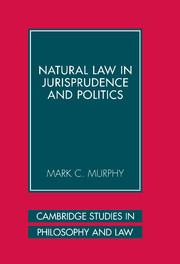Book contents
- Frontmatter
- Contents
- Acknowledgments
- Natural Law in Jurisprudence and Politics
- Introduction: Natural Law Jurisprudence and Natural Law Political Philosophy
- 1 Natural Law Jurisprudence Formulated
- 2 Natural Law Jurisprudence Defended
- 3 The Common Good
- 4 The Natural Law Rejection of Consent Theory
- 5 A Consent Theory of the Authority of Law
- 6 The Authority of Law and Legal Punishment
- 7 Beneath and Beyond the Common Good
- Works Cited
- Index
5 - A Consent Theory of the Authority of Law
Published online by Cambridge University Press: 10 March 2010
- Frontmatter
- Contents
- Acknowledgments
- Natural Law in Jurisprudence and Politics
- Introduction: Natural Law Jurisprudence and Natural Law Political Philosophy
- 1 Natural Law Jurisprudence Formulated
- 2 Natural Law Jurisprudence Defended
- 3 The Common Good
- 4 The Natural Law Rejection of Consent Theory
- 5 A Consent Theory of the Authority of Law
- 6 The Authority of Law and Legal Punishment
- 7 Beneath and Beyond the Common Good
- Works Cited
- Index
Summary
A Non-Standard Consent Account
The salient coordinator account of the authority of law, upon which natural law theorists have of late relied, fails to explain why citizens ought to adhere to the law's dictates rather than to defect unilaterally when so doing would better approximate the determination of the common good that they prefer (4.6). While Finnis's robust coordination account, on which the law is a normatively salient coordinator, explains why we ought to make it the case that the law's determinations of the common good principle are authoritative, that account cannot show that the law is in fact authoritative (4.7).
The aim of this chapter is to explain how citizens' consent can make the law authoritative over them, in a way that is nevertheless consistent with the central thesis of natural law political philosophy – that the law's authority derives from the common good of the political community. The possibility of such an account might be challenged at the outset. Simmons claims, as we saw in 4.4, that the only sense of ‘consent’ in which consent generates requirements of compliance is consent in the occurrence sense – that is, consent that is constituted by the performance of a speech-act. All other senses of consent are attitudinal, in which consent consists merely in an attitude of approval toward the law or toward the de facto authorities, and such consent generates no requirements of compliance.
- Type
- Chapter
- Information
- Natural Law in Jurisprudence and Politics , pp. 112 - 132Publisher: Cambridge University PressPrint publication year: 2006



